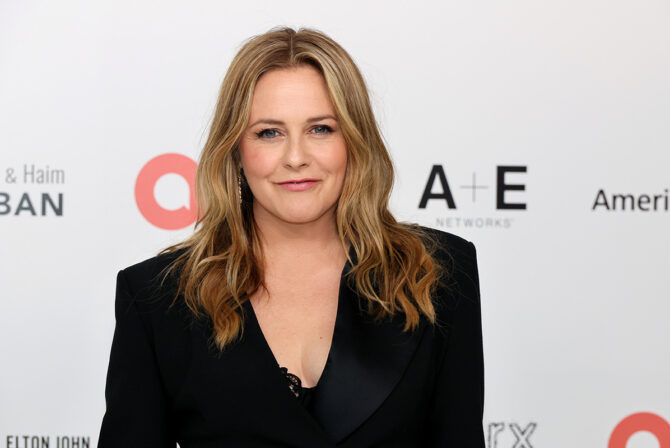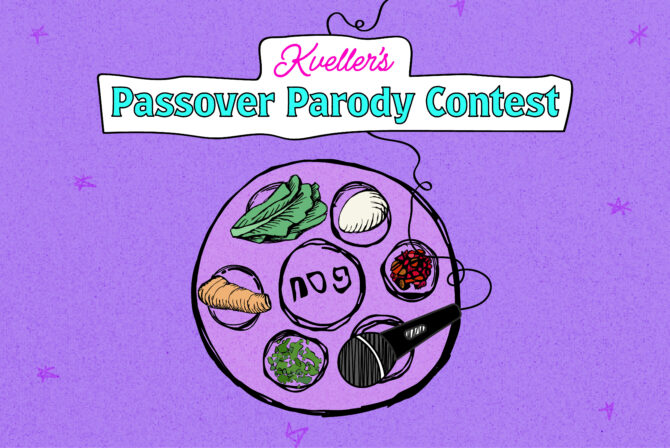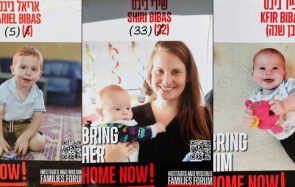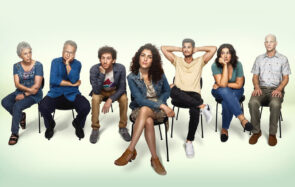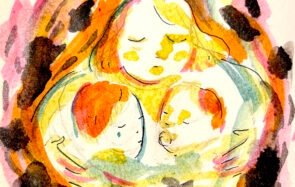As we gear up for our first Kveller book club discussion, here’s an interview with the author of The Little Bride, Anna Solomon. Be sure to check back here tomorrow around noon to discuss the book with Kveller’s contributing editors and other book clubbers! And then, on Thursday August 9, join us for a Twitter chat with Anna from 12-1 p.m. EST by following along with the hashtag #kvellerlit.
What was the initial inspiration for The Little Bride?
I was Googling myself! How lame is that, right? But there you go–it led me on a great adventure. I discovered an Anna Solomon Freudenthal, and a website called Stories Untold: Jewish Women Pioneers. Just the title fascinated me–I’d had no idea that there were Jewish pioneers in the American West. And when I came across one woman, Rachel Bella Calof, who’d been a mail-order bride to North Dakota, I knew I’d found a story I wanted to tell.
What kind of research did you have to do in order to write the book? Did you travel to South Dakota?
My research process was really varied. While I used a number of good old fashioned “history” books, I also relied a lot on primary sources (a magazine called The Yiddish Farmer, for instance, which I read–or rather looked at, since I can’t read Yiddish–on microfilm in the Dorot Reading Room at the New York Public Library) and also on other fictions (Isaac Babel’s Odessa Stories were invaluable to me, as was Willa Cather’s My Antonia). Individual people helped me a lot, too–botanists at South Dakota State University, wonderful librarians, professors, experts in Yiddish. As for South Dakota, I was lucky to have traveled there as a reporter for NPR’s Living On Earth. At the time (2002) my book hadn’t entered my consciousness yet, but I fell in love with the landscape there. It stuck with me, and showed up in a short story I wrote, called
The Prize
, and when I returned to the imaginative landscape of the Plains to write The Little Bride, I knew that South Dakota was where I wanted to set it.
 We see various manifestations of motherhood in the book–Minna’s mother who has fled, Max’s first wife who has fled, Minna’s new role as mother to Jacob and Samuel, and the question of whether Minna will give Max another child. As a mother with your own maternal experiences, how hard was it to write these different portrayals of motherhood, and was there an overall statement you wanted to make about what it means to be a mother?
We see various manifestations of motherhood in the book–Minna’s mother who has fled, Max’s first wife who has fled, Minna’s new role as mother to Jacob and Samuel, and the question of whether Minna will give Max another child. As a mother with your own maternal experiences, how hard was it to write these different portrayals of motherhood, and was there an overall statement you wanted to make about what it means to be a mother?
I didn’t set out to make any kind of statement. I guess my fiction might wind up doing that, depending on who’s reading it and what they want to find, but I don’t generally start out with a message in mind. I began writing The Little Bride just before I got pregnant with my daughter, wrote the first couple hundred pages while pregnant with her, and finished, sold, and revised it after she was born, so my experiences during that time must have influenced the book, whether consciously or not. Certainly mothers, and motherhood, loom large for Minna, whether in the form of her own missing mother or in her ambivalence about becoming a mother herself. If anything, ambivalence may be what I’m exploring most when it comes to motherhood in the book. There are mothers who stay. Mothers who leave. Minna struggles to get pregnant and doesn’t know if she actually wants to.
One thing I was interested in is how we tend to idealize, or at least simplify, women from the past, to think that because their lives were more constrained (or because they appear to have been, to us) that they didn’t struggle with their choices. I was intrigued when I came upon tales of women disappearing from the shtetls, abandoning children and husbands and houses and businesses. It told me that ambivalence about motherhood, and about the many roles we’re expected to play as women, is not in fact a modern phenomenon.
What do you think about arranged marriage as a concept, as opposed to meet-and-fall-in-love-then-marry? Do you think the former is ever better than the latter?
I have no first-hand experience with arranged marriage. I met my husband in college, and though we didn’t start dating until later, we knew each other for over a decade before we got married! Even so, as I think any married person will attest, you never know everything about another person. For those of us who go the meet-and-fall-in-love-then-marry route, discovering this can be pretty shocking. Maybe there’s some freedom in having different expectations up front, as you would with an arranged marriage. You would know that there’s a lot you don’t know. The commitment would take center stage, instead of whether you’re feeling particularly in love with the person on a given day. There’s a realism in that that might actually help make a long-term relationship work, and I know I’ve seen statistics that bear this out.
That said, Minna’s arranged marriage certainly isn’t ideal. There are certain hurdles (like basic attraction, for instance) that I’m just not sure you can get over.
 You’ve written for Kveller before about your “super Jewish toddler,” who seems to be more enthralled with religious ritual than you. In the book, Minna has stopped going to services and does not consider herself religious, yet her new husband is extremely devout. Do you think there are similarities between these two relationships, and are there ways to reconcile different religious standpoints among those closest to you?
You’ve written for Kveller before about your “super Jewish toddler,” who seems to be more enthralled with religious ritual than you. In the book, Minna has stopped going to services and does not consider herself religious, yet her new husband is extremely devout. Do you think there are similarities between these two relationships, and are there ways to reconcile different religious standpoints among those closest to you?
That’s an interesting question. I certainly would never want to compare my relationship to my daughter with Minna’s relationship to Max. I will say I’m endlessly fascinated by the different impulses that lead people toward (or away from) rituals, be they religious or not. In my daughter’s case, I think she’s drawn in by song and dance–by her body. In Max’s, religious observance has become a form of discipline for him; even, you could say, of self-punishment. For Minna, some part of her longs to know how to pray, to lose herself in ritual and tradition; she feels like there would be a certain clarity in that, like if she could just follow along, she would know what to do.
I’m certainly closest to Minna here–some part of me would like to stop overthinking, wrestling with, questioning my relationship to Judaism, and yet my nature makes this hard. I mean, I’m about to have a son and I couldn’t stop myself from going and looking up the pros and cons of circumcision, even though I knew we would wind up doing it! It’s hard for me to just follow–to commit, if you will. I don’t think I’ll ever find an easy place with all this, but that’s okay. I’ll continue to have plenty to write about.
How do you balance writing and mothering? Any indispensable tips for the trade?
Oh gosh. First off I’d say I’m really lucky to have a very supportive husband–I couldn’t do it without him. (Then again, without him there would be no kid to contend with.) For the most part I’ve been able to write fiction in the mornings and do more, shall we say, lucrative work in the afternoons (copywriting, teaching). Now we’re about to have a new baby and honestly I don’t know how I’m going to find the balance this time–what’s going to be practical, what I’m going to want. I know I’ll keep writing, though. Beyond the financial challenges, I struggle like most writing mothers with the emotional/psychological ones. Can I really justify paying for daycare while I write? Can I justify writing when I could be spending time with my kid? Can I justify spending time with my kid when I could be looking harder for paying work which would allow me, maybe, to write more? There are no perfect answers.
For me, the key is discipline, and commitment. (That word again!) I’ve always been disciplined about writing. I don’t do it when the muse strikes, I just do it: I sit down at the same time every day and write. Becoming a mother makes that even more necessary, and has made me even more efficient with my time. When I was pregnant the first time, I went to two two-month-long writing residencies and couldn’t understand how another writer who had a 3-year-old could stand to only be there for two weeks. Then, when my daughter was almost 3, I went again, for only two weeks, and those two weeks felt like an eternity. In a good way.
What are you reading now? What book would you recommend to a mom who has time to read just ONE book this year (besides yours, of course)?
I just finished
Arcadia
by Lauren Groff. I can’t say how much I loved it. I loved it! On every level. I highly recommend it.
I know you said to pick just one, but here are a few other recent favorites:
Season to Taste
, by Molly Birnbaum
Ten Thousand Saints
, by Eleanor Henderson
The Known World
, by Edward P. Jones
The Walking People
, by Mary Beth Keane
Songs for the Butcher’s Daughter
, by Peter Manseau
